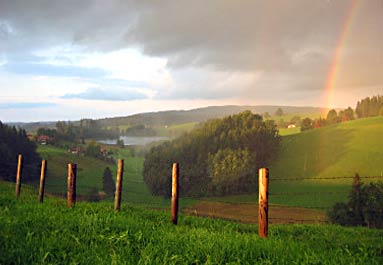This original column is provided free for one-time use with author credit at the end. It may be used for background with author credit. Copyright applies.
#139 FOR IMMEDIATE RELEASE: June 3, 2010
Power outage generates dimly illuminated thoughts
By Curtis Seltzer
BLUE GRASS, Va.—Our county had a scheduled, all-day, electric-power outage this week. No electric meant no television, Internet, computers, ice cubes and lighting.
Water was our major concern. We draw from a spring and depend on an electric pump. So I filled a couple of five-gallon buckets for flushing and a few jugs for consumption.
We have a 1930s-era springhouse with a reservoir that can cool six old-fashioned metal milk containers, the kind that are now considered folk art and display dried flowers in suburban foyers. Built before an electric line was strung up our valley, our system has used gravity to provide a constant flow of weather-proof water for almost 100 years—except for the time that a salamander died in the pipe.
The longest I’ve lived without power and plumbing was two summer months by myself on a Massachusetts mountaintop in a tent when I was 25. Well, I wasn’t always by myself.
It’s not hard to live without power and plumbing in good weather, but I wouldn’t care for a winter of it, let alone a lifetime.
Big government brought electricity to rural areas like Blue Grass after the mid-1930s, because private utilities thought it was too costly to serve the likes of us. The legacy of the New Deal’s Rural Electric Administration is today’s 900 rural coops that serve 42 million people in 47 states. Electricity made farming easier, less labor-intensive and more productive.
Indoor electric lighting from the REA is strongly correlated with the steady decline of average farm-family size during the last 75 years. This empirical relationship was given robust vernacular expression some years ago by an elderly neighbor, Willis G. (Tater) Toths, who revealed: “Roosevelt lost this county every year after that line came in; more light meant less nooky.”
It’s easy to forget that most of civilization’s best ideas, greatest documents and most influential books were produced without either electric or indoor.
An all-day outage gave me an excuse to not write. For almost 30 years, I’ve written everything on a computer. I began with a Kaypro II, an aluminum box that looked like an old oscilloscope and ran on what a paper-and-pencil former boss kept calling, “your sloppy disks.” Together with a tractor-driven printer, this system -- now considered a “legacy” set up -- cost $5,000 and crashed every week for reasons that were obscure. Losing files was said to be a small price to pay for never having to replace another typewriter ribbon. The Kaypro salesman told me this when I was paying the bill for having him “realign my head,” a job that remains on my to-do list.
I’m out of practice thinking-writing without a computer; I’m not sure I can still do it with anything less than a typewriter. So I scratched thinking-writing from my no-electric-day schedule. This left thinking-doing and thinking-thinking, which is usually best avoided by people who are forced to work for money.
I went up to our woods and cut locust fence posts and firewood for several hours until even Noel Coward’s Mad dogs and Englishmen had come in out of the midday sun.
I retreated to the glade on Devil’s Backbone where I hang out. A cold spring feeds a pool the size of a kitchen table at about 3,300 feet. Melissa and I built a small deck in the shade above the spring years ago that faces Snowy Mountain.
I drank a quart of water and kept the bugs at bay with a decent cigar.
I had no current grievance, so I read about Aaron Burr, a man of mixed politics (a centrist between Federalists and Jeffersonians), mixed opinions (a feminist who believed in education and voting rights for females, as well as a sort-of abolitionist who owned a slave or two) and mixed motives wrapped in intrigues.
Apart from killing Alexander Hamilton, Burr is remembered for being acquitted of treason. President Jefferson leveled this charge against him based on reports that Burr was trying to set up a new, slave-free country/monarchy in the Spanish-owned Texas territory and parts of recently purchased lands west of the Mississippi, known as the Louisiana Territory.
Burr, indeed, was advocating something like that, and he had organized an expedition to do something that would probably have turned into something like that had it not been stopped.
Southerners in the early 1800s generally supported the idea of taking land from the Spanish in western Florida, Texas and even Mexico. The independent Republic of Texas (1836-1846) traced some of its roots back to Burr’s notions. Burr said shortly before his death in 1836 that he was just 30 years ahead of his time.
One thing was clear in the murk of Burr’s 1806 efforts—his political plans fit with his own financial interests. He had purchased about 300,000 acres in what is now Northeast Louisiana and Southeast Arkansas and also leased 40,000 Texas acres from the Spanish.
Despite Jefferson’s pretrial announcement that Burr was a traitor, he was exonerated, because no evidence was introduced that he had ever committed an overt act either in "levying War against [the United States], or in adhering to their Enemies, giving them Aid and Comfort."
Burr had fought well in the Revolution, served honorably in the U.S. Senate and as vice president, and started the bank that evolved into Chase Manhattan and later JP Morgan Chase. His treason trial left him tarnished and broke for the next three decades.
And when I got tired of reading, I daydreamed.
People who own rural land sooner or later wander around to the idea of building a house on it. Melissa has said for a long time that she’d be willing to sell our farm and move up into the woods.
The woods are higher, colder and wilder than where we live even though they’re only two miles distant. The little pond is another half mile into the forest, all uphill.
I’ve thought about enlarging the pond and building a one- or two-room cabin with no grid-electricity or plumbing. I have in mind a cupcake, not a wedding cake.
A year-round residence would run a minimum of $200,000, and likely more depending on size, materials, infrastructure and frou-frous.
A place like that would change the woods.
I think our patience and resources would collapse under the strain of living up there when the snow was over my knees and the temperature was below my line of sight. I can’t see Melissa snowshoeing up the mountain in her three-inch prosecutor heels at 7 p.m. night after night when it’s black as a coal mine and colder than an IRS auditor. I think she would expect shuttle service from me. I would need a bulldozer—that’s the upside of this idea.
Mainly, I think, I’m too old for this at 64, too old to take on a two-year project, too old to spend so much time doing basic-living chores every day, too old to secede and set up a little burr of a monarchy.
Were either of us to be bitten by one of the wolves that lurk in these years of our lives, a nice home in the woods would become a distress sale.
And though I like the idea of having a defensible excuse to buy a bulldozer, I think it’s best to spend time in the woods rather than spend money that would change them.
Curtis Seltzer is a land consultant who works with buyers and helps sellers with marketing plans. He is author of How To Be a DIRT-SMART Buyer of Country Property at www.curtis-seltzer.com where his weekly columns are posted. He also writes for www.landthink.com.
Contact: Curtis Seltzer, Ph.D.
Land Consultant
1467 Wimer Mountain Road
Blue Grass, VA 24413-2307
540-474-3297
curtisseltzer@htcnet.org
www.curtis-seltzer.com
This original column is provided free for one-time use with author credit at the end. It may be used for background with author credit. Copyright applies.
|









